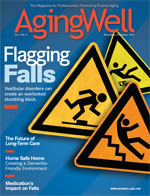November/December 2009 Steps to Longevity Committing to a consistent regimen of walking contributes to healthful aging. It requires no membership, costs nothing, and requires only the dedication to exercise on a regular basis. And exercise is an important component of longevity. Aging well doesn’t happen by accident. It requires effort from those who want to age well. It requires real work and dedication not only to oneself but also to one’s life. It’s not enough to persevere in helping the body age well; it requires a commitment to preserving the mind as well. We have no definitive evidence that brain aerobics, for example, through physical activity, social interaction, or intellectual stimulation, stalls Alzheimer’s disease. But we do know these activities help maintain cognitive vitality or brain health and are very important for the enjoyment of old age. That enjoyment requires some sense of genuine purpose—to continue to work or undertake volunteer activities, such as joining Experience Corps or ReServe to maintain a vital, productive relationship to society. We know that perhaps no more than 25% of our health and longevity depends on genes, leaving some 75% up to us. This offers us a lot of power but also entails genuine responsibility and self-care. We need to expand our prevention efforts through a broad public health perspective. For example, there are some 15,000 senior centers throughout the United States. These are community facilities, 5,000 of which receive support of various types from the Administration on Aging. But the utilization rate is not what it should be. Senior centers need to be modernized and updated in at least two respects, both of which support healthy aging. First, senior centers should promote exercise, diet, and other healthful behaviors. Second, closely related to an individual’s purpose, older adults should be encouraged to contribute more directly to their communities. Such modifications of senior centers would promote healthy aging. Congress could focus on providing revenue to update and upgrade senior centers nationwide through measures designed to increase revenue. For example, taxation and education were very effective in the 50% reduction of smokers in the United States since 1964. But alcohol use in America continues to plague a significant number of hard-core alcoholics, affecting one of every four Americans. Alcohol abuse contributes to most domestic abuse and significant numbers of highway fatalities and other accidents. Alcohol taxes used to constitute a significant portion of federal revenue. However, there have been only a few increases in liquor taxes since 1950. This is an issue that Congress could revisit. Of course healthy aging is a life course issue. It’s not something to simply introduce at the age of 50, 60, or beyond. A few years ago, several of us wrote a paper in The New England Journal of Medicine on the problem of obesity in America and the prospect that we may lose three to five years of life expectancy from the 30 additional years of life we gained in the 20th century. Further, for the first time in our history, our children may die before their parents. It is sad to see 10-year-old children who are obese and already have type 2 diabetes. I call on the citizens of America, the President’s Council on Physical Fitness and Sports, the U. S. Preventive Services Task Force, and other appropriate organizations to help sponsor a national walking movement through which friends, neighbors, and families would walk together to increase their exercise levels. This is not expensive and requires no membership in a health club. A national walking movement is a simple but important step in dealing with the problem of obesity. It is critical to recognize the cost of failed health promotion and disease prevention. We must go beyond the doctor-patient relationship to achieve the goals of healthy aging, which requires healthy living throughout the life span. It is never too late to start and always to soon to stop. — Robert N. Butler, MD, is president and CEO of the International Longevity Center in New York City. |

